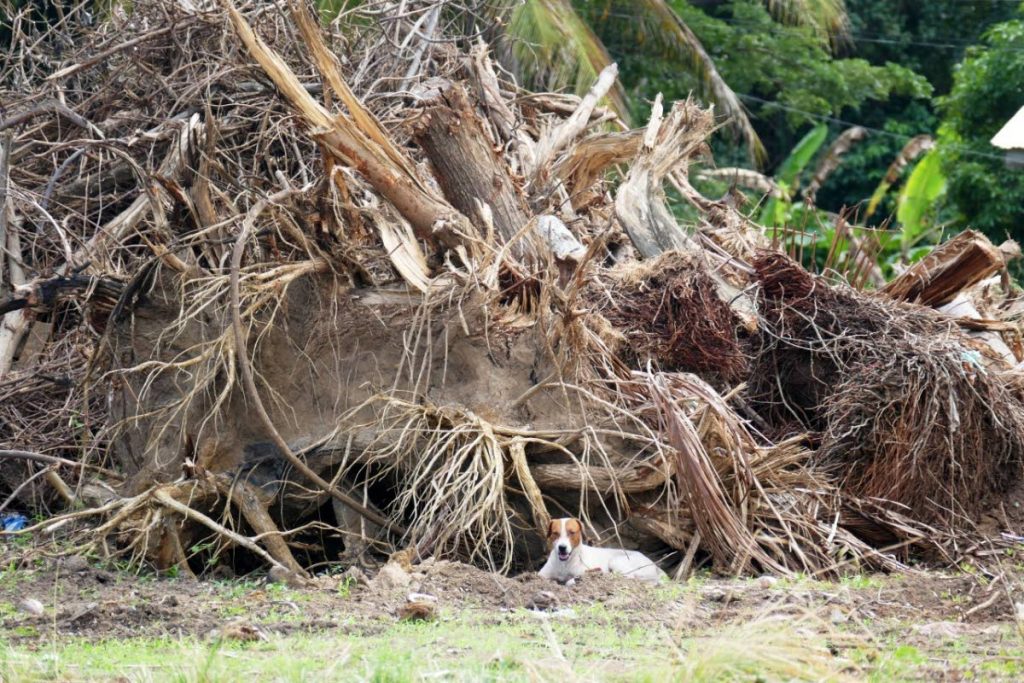The refugee dogs of Tobago

THERE are many homeless dogs in Tobago. Some are born on the streets and survive various diseases and human-related threats (poisoning, chopping, car accidents) to grow into homeless adult canines. Unless they are spayed/neutered, taken off the streets by animal rescuers or adopted, these canines mate continuously and produce offspring, repeating the vicious cycle. Other homeless dogs were either dumped, or scared away from home by loud fireworks and bussing bamboo. Lost, wandering, they too become street statistics.
Recently, there is a new brand of dog in Tobago. I refer to these dogs as Tobago’s refugee dogs…those who have been left behind by owners who have accepted the Government’s “packages” and relocated after their homes were demolished to make way for proposed airport expansion. When one owns and lives on a large parcel of land, one’s animals (dogs, cats, goats, sheep, chickens, etc.) have ample space in which to live. What happens when that home/landowner is required to move to rental accommodation that has no space for animals or whose landlord is unfortunately of the common “No animals allowed” variety?
Dr Raquel Small, head vet at the TTSPCA Tobago animal shelter, says: “Most landlords do not allow you to keep animals for various reasons, so a lot of people when they move, abandon pets or dump them in the rainforest. It is a problem. Currently 50 per cent of dogs at the shelter have been abandoned by owners who have moved and left them.”
Recently I was struck by the heartbreaking sight of a brown-and-white male dog trundling over wasteland (once occupied by houses) with the signature blue “no trespassing” sheet metal fence (erected by the Chinese) as his backdrop. As he flopped down, almost protectively, in front of a heap of rubble, I sensed that he still thought of the demolished mass as “home.” There he lay, waiting…for owners who would most likely never return.
A kind woman and her husband, living in Bon Accord, have started feeding a new batch of “refugee dogs” in their area. Some of the females are currently in heat. Left unspayed, they will contribute to Tobago’s rapidly increasing canine overpopulation.
In reference to relocated residents’ abandonment of dogs, Rhonda Hackett, president of the PEECE Negotiation Movement for Equal and Equitable Compensation, commented that it is “almost as bad” as leaving one’s child behind. “It is worse than that,” I said, pointing out that both children and animals are dependants, but whereas a human adult who abandons a child will (ideally) be arrested and prosecuted, nothing will happen to those who abandon their animals. “At least nothing will happen in TT,” Hackett rightfully added.
The option of boarding their dogs at the TTSPCA Tobago animal shelter is not one of which many affected residents are aware and, even if they were... $60 a day over an indefinite period of time, it is not an option that most (if any) would be able to afford. The little money they do have after being “compensated” will disappear quickly into the black hole known as rent. How much of that money will be left for them to buy land and build new homes? One resident who has already moved from her original home and is renting, relinquished her son’s pet dog to the TTSPCA in Bacolet. One can imagine how traumatic such a loss was for both child and pet.
A progressive government is one that would ensure that its nation’s human and animal populations are well catered for, especially in the event of massive change being made in the name of “progress.”
“Progress and development are nothing without humanity,” an affected female resident told me recently. She, and many others, are of the “we’re not moving” variety. In conversation they refer easily and openly to the “lack of respect” being meted out to them by authorities, the resulting stress (and in some cases death) experienced by residents who have chosen to accept the money and relocate; the “bold-facedness” of the Chinese (“Imagine the Chinese put up sign saying ‘No trespassing’ – on we own land!”); the broken promises…
In October 2020, Secretary of Health, Wellness and Family Development Tracy Davidson-Celestine announced that the TTSPCA Tobago animal shelter (Bacolet) would receive a $10,000 monthly subvention from the division. The promise was highlighted widely in the media. To date, the TTSPCA has had neither sight nor sound of the promised (and desperately needed) funds.
The animal shelter is constantly overcrowded. Irresponsible owners dump unwanted dogs and cats over the shelter’s gates and people bring large litters of puppies and kittens – a problem exacerbated by the fact that owners are unable to afford spaying/neutering or (common in Tobago) do not believe in the procedure due to religious convictions or superstition. Can the overburdened shelter afford to welcome the growing numbers of refugee dogs of Tobago? The answer is no.
In chatting with a young woman in one of the affected areas, I asked if she had any pets. She took me to see her dog, a sweet female who had given birth to seven pups two weeks ago. “What will you do with her if you have to move?” I asked.
“I will call the vet to take them,” she said, unaware of the reality of the overcrowded, under-staffed, never-funded-by-government animal shelter.
At this juncture, it is natural to pause and ask if, in this nation’s pursuit of progress and development, the ultimate well-being of all living beings is considered and, if not, why.


Comments
"The refugee dogs of Tobago"